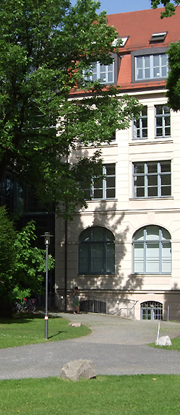How to Apply for PhD Studies in Modern History at the LMU
 Have you thought about starting a PhD in history? If you hold an excellent Master's degree in an historical subject, and if you are interested in doing a PhD in history, there may be ways to do it at the University of Munich. However, there are various things that you need to take in mind before you get started.
Have you thought about starting a PhD in history? If you hold an excellent Master's degree in an historical subject, and if you are interested in doing a PhD in history, there may be ways to do it at the University of Munich. However, there are various things that you need to take in mind before you get started.
First and foremost, you ought to be aware that the academic system in Germany may vary in some respects from the university system you are familiar with. For example, in the German system, a postgraduate is expected to be already well accomplished in reseach methods before he or she starts doing a PhD, and he or she should be able to carry out research largely single-handedly. Doctoral programmes such as ProMoHist have recently contributed to intensify supervision, but still doctoral studies in Germany entail much less teaching and supervision than, e.g., in Britain or in the US.
At the very outset, you should check whether you may be eligible to doctoral studies. Admission to PhD studies in Munich is regulated by the Statute and Guidelines for the Degree of Doctor of Philosophy (Dr. phil.) at the LMU, the Promotionsordnung. A copy of it is available online at http://www.uni-muenchen.de/studium/studienangebot/studiengaenge/studienfaecher/neuere/prom/index.html (in German language only, incl. links to various amendments etc.).
Broadly speaking, you need to have studied the subject of your PhD studies for eight semesters, having finished with a good MA degree or an exam in Education Studies (History) along the lines of a German Staatsexamen. Exceptions can be granted by the doctoral commission of the Examinations Office (http://www.pags.pa.uni-muenchen.de/ueber_uns/index.html), e.g., if a degree in another subject includes very substantial historical components. To find out if you meet the necessary requirements for an application you can contact the International Office of the University or a potential supervisor.
Second, you need to think of how to secure your maintenance once you move to Germany. Unfortunately, we are not able to award scholarships to cover the costs of living in Munich or of travelling to and from Munich. So you may depend on your own financial resources or you may need to apply for grants from funding bodies in your home country or in Germany (such as the DAAD).
 If you think that you may be able to take these two steps, you should start to proceed by identifying and contacting a potential supervisor (generally, in the German system, a professor) who is willing to accept you as a doctoral student. This would need an outline of the subject you want to do research on, including a sketch of the state of research and a bibliography. Once you have secured his or her support, you should ask him or her to provide you with a letter of acceptance (Betreuungszusage is the appropriate German term).
If you think that you may be able to take these two steps, you should start to proceed by identifying and contacting a potential supervisor (generally, in the German system, a professor) who is willing to accept you as a doctoral student. This would need an outline of the subject you want to do research on, including a sketch of the state of research and a bibliography. Once you have secured his or her support, you should ask him or her to provide you with a letter of acceptance (Betreuungszusage is the appropriate German term).
When you have obtained this letter of acceptance from your supervisor you can apply for admission as a doctoral student at the relevant Examinations Office (Prüfungsamt) for the humanities and social sciences (http://www.pags.pa.uni-muenchen.de/ueber_uns/index.html). Their commission will check whether your qualifications comply with the requirements for admission. If you meet these requirements, they will confirm that you are admitted to pursue doctoral studies (i.e. you will receive a certificate called Promotionsberechtigung).
If you are not a German citizen, you also need to register with the International Office (closing dates: January 15th / July 15th). For registration, you will need to supply the office with a copy of your certificate of admission. You will then receive a Zulassungsbescheid by the university. This certificate is an important legal document to be submitted in all immigration issues. The office have issued a guideline on the process of registration. They will also support you with your subsequent enrolment at the university. After your matriculation you can attend classes for doctoral studies and pursue your research.
After your admission to the university, you can also apply for admission to the doctoral programme ProMoHist (closing date, usually, February 15th). For details of the doctoral programme, please contact Dr. Martin Schmidt.

